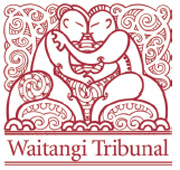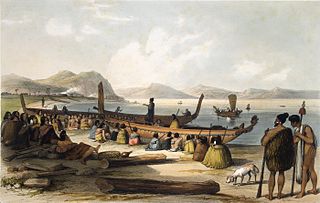
The Waitangi Tribunal is a New Zealand permanent commission of inquiry established under the Treaty of Waitangi Act 1975. It is charged with investigating and making recommendations on claims brought by Māori relating to actions or omissions of the Crown, in the period largely since 1840, that breach the promises made in the Treaty of Waitangi. The Tribunal is not a court of law; therefore, the Tribunal's recommendations and findings are not binding on the Crown. They are sometimes not acted on, for instance in the foreshore and seabed dispute.

The New Zealand Parliament is the unicameral legislature of New Zealand, consisting of the Sovereign (King-in-Parliament) and the New Zealand House of Representatives. The King is usually represented by his governor-general. Before 1951, there was an upper chamber, the New Zealand Legislative Council. The New Zealand Parliament was established in 1854 and is one of the oldest continuously functioning legislatures in the world. It has met in Wellington, the capital of New Zealand, since 1865 and in its current building since 1922.
The New Zealand foreshore and seabed controversy is a debate in the politics of New Zealand. It concerns the ownership of the country's foreshore and seabed, with many Māori groups claiming that Māori have a rightful claim to title. These claims are based around historical possession and the Treaty of Waitangi. On 18 November 2004, the New Zealand Parliament passed a law which deems the title to be held by the Crown. This law, the Foreshore and Seabed Act 2004, was enacted on 24 November 2004. Some sections of the act came into force on 17 January 2005. It was repealed and replaced by the Marine and Coastal Area Act 2011.

The Resource Management Act (RMA) passed in 1991 in New Zealand is a significant, and at times, controversial Act of Parliament. The RMA promotes the sustainable management of natural and physical resources such as land, air and water. New Zealand's Ministry for the Environment describes the RMA as New Zealand's principal legislation for environmental management.

In New Zealand politics, waka-jumping is a colloquial term for when a member of Parliament (MP) either switches political party between elections or when a list MP's party membership ceases.

The Statute of Westminster Adoption Act 1947 was a constitutional Act of the New Zealand Parliament that formally accepted the full external autonomy offered by the British Parliament. By passing the Act on 25 November 1947, New Zealand adopted the Statute of Westminster 1931, an Act of the British Parliament which granted full sovereign status and Commonwealth membership to the Dominions ratifying the statute. New Zealand was the last Dominion to do so, as the Dominion of Newfoundland voted to become a part of Canada in 1948.

The constitution of New Zealand is the sum of laws and principles that determine the political governance of New Zealand. Unlike many other nations, New Zealand has no single constitutional document. It is an uncodified constitution, sometimes referred to as an "unwritten constitution", although the New Zealand constitution is in fact an amalgamation of written and unwritten sources. The Constitution Act 1986 has a central role, alongside a collection of other statutes, orders in Council, letters patent, decisions of the courts, principles of the Treaty of Waitangi, and unwritten traditions and conventions. There is no technical difference between ordinary statutes and law considered "constitutional law"; no law is accorded higher status. In most cases the New Zealand Parliament can perform "constitutional reform" simply by passing acts of Parliament, and thus has the power to change or abolish elements of the constitution. There are some exceptions to this though – the Electoral Act 1993 requires certain provisions can only be amended following a referendum.

The New Zealand Constitution Act 1852 was an Act of the Parliament of the United Kingdom that granted self-government to the Colony of New Zealand. It was the second such Act, the previous 1846 Act not having been fully implemented. The purpose of the Act was to have constitutional independence from Britain. The definition of franchise or the ability to vote excluded all women, most Māori, all non-British people and those with convictions for serious offences.

The Oranga Tamariki Act 1989 or Children's and Young People's Well-being Act 1989 is an Act of the New Zealand Parliament that was passed in 1989. The Act's main purpose is to "promote the well-being of children, young persons, and their families and family groups." In June 2017, the New Zealand Parliament passed amendment legislation renaming the bill the Oranga Tamariki Act 1989.

New Zealand–United Kingdom relations are the bilateral relations between New Zealand and the United Kingdom. New Zealand has maintained a close relationship with Britain, since gaining independence from the United Kingdom.

The Crimes Act 1961 is an act of New Zealand Parliament that forms a leading part of the criminal law in New Zealand. It repeals the Crimes Act 1908, itself a successor of the Criminal Code Act 1893. Most crimes in New Zealand are created by the Crimes Act, but some are created elsewhere. All common law offences are abolished by section 9, as are all offences against acts of the British Parliaments, but section 20 saves the old common law defences where they are not specifically altered.

The New Zealand Constitution Amendment Act 1947 was an enactment passed by the Parliament of New Zealand requesting and consenting to the subsequent enactment by the Parliament of the United Kingdom of the New Zealand Constitution Amendment Act 1947. The latter Act contributed to the independence of New Zealand, by granting the Parliament of New Zealand the complete ability to amend the New Zealand Constitution Act 1852, an enactment of the Parliament of the United Kingdom which established the institutions of responsible government in New Zealand.

The National Development Act 1979 was an Act of Parliament in New Zealand. It was a controversial Act and was repealed by the National Development Act Repeal Act 1986.
The publishing of any "blasphemous libel" was a crime in New Zealand under Section 123 of the Crimes Act 1961 which allowed for imprisonment for up to one year. However, Section 123 protected all publications and opinions on any religious subject expressed in good faith and decent language against prosecution and specified that prosecution may proceed only with the leave of the attorney-general.

The Piracy Act 1850, sometimes called the Pirates Repeal Act 1850, is an Act of the Parliament of the United Kingdom. It relates to proceedings for the condemnation of ships and other things taken from pirates and creates an offence of perjury in such proceedings.

The Constitution Act 1986 is an Act of the New Zealand Parliament that forms a major part of the constitution of New Zealand. It lays down the framework defining fundamental political principles of governance, and establishes the powers of the executive, legislative and judicial branches of state. It outlines the roles and duties of the monarch, the governor-general, ministers and judges. The Act repealed and replaced the New Zealand Constitution Act 1852 and the Statute of Westminster, and removed the ability of the British Parliament to pass laws for New Zealand with the consent of the New Zealand Parliament.

The COVID-19 Public Health Response Act 2020 is a standalone legislation passed by the New Zealand Parliament on 13 May 2020 to provide a legal framework for dealing with the COVID-19 pandemic in New Zealand over the next two years or until the COVID-19 pandemic is brought under control. The Act allows the Minister of Health to make orders under Section 11 to give effect to the public health response to the COVID-19 in New Zealand.

Karen Louise Chhour is a New Zealand politician. She has been a member of parliament for ACT New Zealand since the 2020 general election.

The Smokefree Environments and Regulated Products Amendment Act 2022 is an act of the New Zealand Parliament that seeks to combat smoking by limiting the number of retailers allowed to sell smoked tobacco products; ban the sale of smoked tobacco products to anyone born on or after 1 January 2009; and to discourage the consumption of smoked tobacco products. The bill passed its third reading on 13 December 2022 and received royal assent on 16 December 2022. The new National-led coalition government announced in late November 2023 that they intended to repeal the legislation. The Smokefree legislation was repealed under urgency on 28 February 2024.

The Three Strikes Legislation Repeal Act 2022 is an omnibus Act of Parliament passed by the New Zealand Parliament that repeals the elements of the Sentencing and Parole Reform Act 2010, which constitute the so-called three-strikes law. The bill passed its third reading on 9 August 2022 with the support of the governing Labour Party, the allied Green Party, the Māori Party but was opposed by the opposition National and ACT parties. The following year the Sixth National Government took power and has pledged to reinstate the three strikes law.







